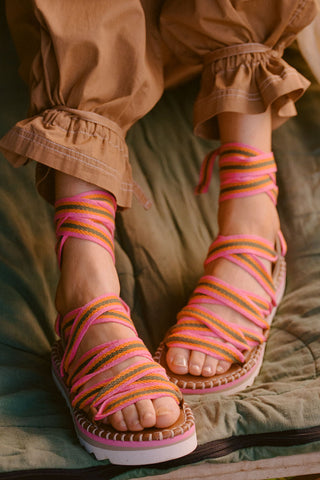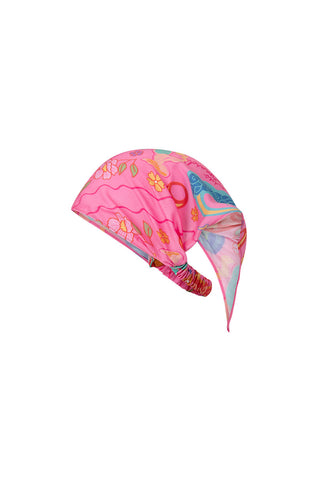Our Lady Palm styles have been carefully crafted using the most beautiful handloom woven fabric, created by artisanal weavers in India. Handloom weaving is a skilled process, where the artisan weaver creates a handwoven fabric on a loom, with each piece being entirely unique. The handloom fabric has been woven using GOTS certified organic cotton and dyes whilst the stripes and colours have been carefully chosen to celebrate the natural landscape entwined into our Utopia collection.
handloomed with love
Handloom weaving is an ancient tradition, an intricate art passed on between generations. In India, this art form is suffering with the introduction of the faster, more cost effective power loom. It is important to recognise the traditional handlooming method in order to support the rich cultural heritage and socio-economic development of the country. National Handloom Day is celebrated in India each year on the 7th of August and recognises the importance of these talented craftspeople alongside the Swadeshi Movement that promotes the use of Indigenous products.
There are many reasons why we love and celebrate the beauty of this technique. By crafting our Lady Palm styles with handloom fabrics, we offer support and empowerment to the artisans who continue this tradition and honor their heritage - creating positive social, economic and environmental outcomes. Handlooms require little to no energy or water to run, therefore minimise carbon emissions - this also allows rural communities that may not have access to constant power the opportunity to weave, offering a source of income.
We are proud to have been partnered with our supplier in India since 2016. Much like ourselves, Vipin and Mohini are passionate about the use of preferred fibers, dyes and processes that minimise our impacts on both people and the planet. They have achieved GOTS certification within their facility and also undertake an annual SMETA audit (Sedex Members Ethical Trade Audit). Our Lady Palm styles are our most recent collaboration and offer us visibility of each stage of the product’s lifecycle. From fibre to fabric to our finished garments - from the farmers growing the organic cotton, to the artisan weavers creating the fabric to the people sewing each garment.
Whilst celebrating the beauty of this technique, we offer support and empowerment to the artisans who continue this tradition and honour their heritage, creating positive social, economic and environmental outcomes. Handlooms require little to no energy or water to run, therefore minimise carbon emissions. This also allows rural communities that may not have access to constant power the opportunity to weave, offering a source of income.
Whilst celebrating the beauty of this technique, we offer support and empowerment to the artisans who continue this tradition and honour their heritage, creating positive social, economic and environmental outcomes. Handlooms require little to no energy or water to run, therefore minimise carbon emissions. This also allows rural communities that may not have access to constant power the opportunity to weave, offering a source of income.
A note from Vipin and Mohini -
"The Handloom sector plays a very important role in the country's (India’s) economy & the grim reality today is that an overwhelming majority of handloom weavers are living in poverty, while many others have left the occupation due the very limited domestic & International demand of Handloom products. If international brands like Spell would help to give Handloom weavers some work it would definitely be a great support & will definitely create a social impact for the Artisans and this rich heritage can be saved if Artisans get work & continue working in this sector. Continuous demand of Handloom products may ensure sustainable & satisfactory livelihoods of handloom weavers.
Organic Certified Cotton Fibre and Chemical free dyes are used to produce this, saving our environment from the use of toxic chemicals. And due to the widely perceived need to check greenhouse gas emissions, the case for handloom cloth is becoming stronger by the day. If handloom cloth can be linked closely to organic cultivation of non-GM cotton, its strength as eco-friendly cloth can become much stronger. This is going to be a big asset in the days to come. Handloom produce should be given a place of pride in the textiles industry."


































